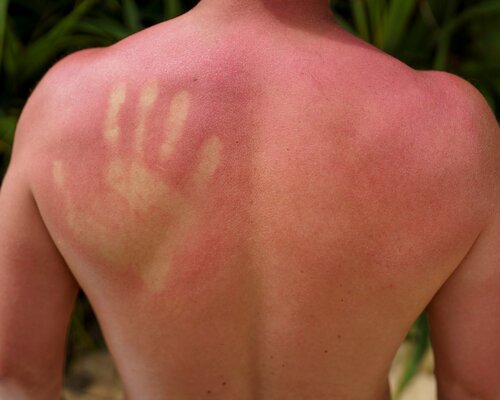Sunburn
Sunstroke can occur quickly in children, especially when they are inadequately protected from the heat. Symptoms include nausea, headache, dizziness and excessive sweating. Here are steps you can take:
- Action Plan: Remove the child from the sun immediately and take him or her to a cool place indoors.
- Cooling: undress the child and use a sponge to gently rinse with lukewarm water. Avoid ice-cold water to avoid sudden temperature changes.
- Hydration: Make sure the child drinks enough water. Let it rest and check its temperature regularly.
- Medical attention: In case of severe symptoms such as changes in breathing or loss of consciousness, call medical attention immediately.
Hypothermia
Hypothermia can be insidious, even during hot summer days, especially after prolonged swimming in cold water. Watch for these signs:
- Symptoms: Shivering, pallor, decreased alertness and cold skin.
- Warming up: remove wet clothing and give a hot shower at about 38 degrees Fahrenheit. Warm drinks such as tea or hot chocolate can also help.
- Emergencies: In case of severe drowsiness or other worrisome symptoms, call the emergency number for advice and further instructions.
Diarrhea
Diarrhea is common in children during the summer and can have several causes, such as infection or food-related problems. Here's what you can do:
- Hygiene: Maintain strict hygiene measures, especially hand washing to prevent spread.
- Hydration: Make sure the child gets enough fluids, preferably water, soup or tea.
- Medical evaluation: Contact a physician if diarrhea persists for more than 24 hours, blood or mucus is present in the stool, or if high fever occurs.
Poisoning
Summer brings exposure to potentially toxic substances such as certain plants, drugs or cleaning products. Recognize the symptoms and act appropriately:
- Symptoms: Dizziness, shortness of breath or severe nausea.
- First Aid: Search online or call your doctor directly for specific instructions based on the type of poisoning.
- No immediate actions: Do not attempt self-induced vomiting unless medically advised.
Jellyfish stitch
Jellyfish stings are often painful and can cause an allergic reaction. Follow these steps:
- First aid: Carefully remove any residue from the jellyfish. Use a cold, wet cloth to dab the affected skin.
- Allergic reaction: Call immediate medical attention if the child has difficulty breathing or shows other severe symptoms.
Being Prepared for Summer Inconveniences
As a parent, it is crucial to be prepared for potential summer health problems in children. Knowledge of first aid procedures can not only alleviate suffering, but also ensure the safety and well-being of your children during these joyful but sometimes challenging seasons. Make sure you always have a well-stocked first aid kit on hand and know where to find medical help if needed.
With these practical tips, you'll be better prepared to respond quickly and effectively when summer discomforts arise, helping your children feel comfortable and safe during their summer adventures.





